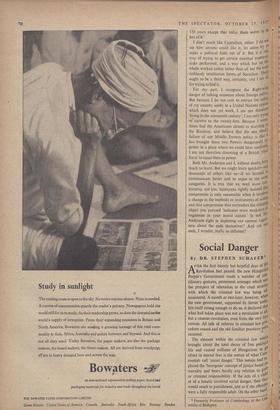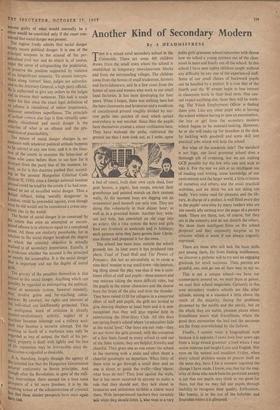Social Danger
By DR. STEPHEN SCHAFER.
AFTER the first bloody but hopeful days of the Revolution had, passed, the new Hungarian People's Government made a number of al. ciliatory gestures, prominent amongst which was the prospect of relaxation in the cruel severity with which the criminal law was being ad' ministered. A month or two later, however, when the new government, supported by Soviet tanks, felt itself strong enough to do so, it declared that what had taken place was not a revolution at all, but a counter-revolution, even from the very first minute. All talk of reforms in criminal law pro' cedure ceased and the old familiar practices were resumed. The element within the criminal law whieh, brought about the total decay of free political life and caused millions of Hungarians to g° about in mortal fear is the notion of what Cool" munists call 'social danger.' This notion had re' placed the 'bourgeois' concept of justice based on morality and bears hardly any relation to guilt or criminal responsibility. If the acts of a child or of a lunatic involved social danger, then they would result in punishment, just as if the offender were a fully responsible adult. On the other hand' * Formerly Professor of Criminology at the Oil' versity of Budapest.
anyone guilty of what would normally be a crime would be convicted only if the court con- sidered that social danger was present.
The regime freely admits that social danger 'imply means political danger. It is one of the principal weapons in the arsenal of the per- Petualised civil war and its object is, of course, under the cover of safeguarding the proletariat, to preserve the position supported by violence of an insignificant minority. To ensure interpre- tation along 'correct' lines, judges are subordin- ated to the Attorney-General, a high party official. He is authorised to give any orders to the judges and to reverse their sentences. This task is made easier for him since the exact legal definition of an offence is considered of minor importance, Moreover sometimes superfluous. The principle of million (Timm sine lege is thus virtually com- pletely abandoned and social danger is the criterion of what is an offence and the pre- condition of punishability. The nature of social danger changes in ac- cordance with whatever political attitude happens to be correct at any one time, and it is the func- tion of the courts to examine the behaviour of those who come before them to see how far it diverges from the party line of the moment. In- deed, so far is this doctrine pushed that, accord- ing to the present Hungarian Criminal Code (Statute 11, 1950), even a foreign national resident abroad could be tried by the courts if he had corn- Ittitted an act of so-called social danger. Thus a Ilritish subject, being 'socially dangerous' in London, could be proceeded against, even though what he did would not be considered a crime any- Where else in the world.
The factor of social danger is so construed by the courts that even an attempted or uncom-, pleted offence is in abstract() equal to a completed crime. All three are similarly punishable, for in relation to the social danger involved the degree to which the criminal objective is actually realised is of secondary importance. Equally, it is irrelevant whether the accused is the principal Or merely the accomplice. It is the social danger that is important and not the degree of moral guilt.
The gravity of the penalties themselves is also related to this social danger. Anything which can Possibly be regarded as endangering the political, social or economic system, however remotely, rnitY involve grave and far-reaching conse- quences. By contrast, the rights and interests of the individual are indifferently prOtected. Thus an ambiguous word of criticism is already counter-revolutionary activity, neglect of a machine becomes sabotage and a railway acci- dent may become a terrorist attempt. Yet the crushing to death of a workman may only be regarded as loss of output, the theft of his per- s°nal property is dealt with lightly and the loss of his reputation may be irrevocable since de- nunciation is regarded as desirable.
It is, therefore, largely through the agency of the criminal law that the Hungarian Government ensured conformity to Soviet principles. And though after the Revolution, in spite of the mili- tarY intervention, there seemed for a time some
A Prospects of a bit more freedom, it is by the crushing action of the administration of criminal law that these slender prospects have once again been lost.



































 Previous page
Previous page